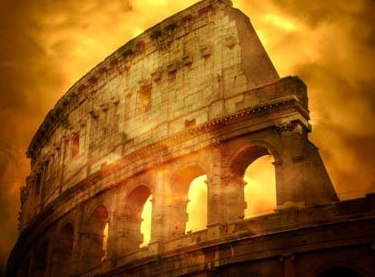Emperium also gave the Roman King the right to
絕對主權(quán)也使羅馬皇帝有權(quán)
command troops in battle or to interpret the law which
在戰(zhàn)爭中統(tǒng)治軍隊并對法律做出解釋
commanded everyone. This was an awful lot of power
而這些法律控制著所有的人
for one person to have, even in ancient Rome and it
無上的權(quán)力集中在一個人手中,而這種
was not always used wisely. After the Romans
權(quán)利的應(yīng)用并不總是十分明智的
traded their monarchy for a Republic in 509BC
公元前509年羅馬共和國成立

the emperium was always held by at least 2 officials
之后絕對主權(quán)通常由至少兩名
at one time. By the time of Christ Rome had become
官員掌控,當(dāng)羅馬帝國成為了
the greatest power in the known world. The term
世界上最強(qiáng)大的帝國之時,絕對主權(quán)
emperium had taken on an additional meaning.
一詞又附加了另外一層意義
The term 'emperium romanum' now described
現(xiàn)在"羅馬帝國"一詞指的是
both Roman power and Roman space as applied to all
羅馬和羅馬的疆域,包括
of the lands where Rome herself held emperium.
處于羅馬絕對主權(quán)管理之下的所有土地
Let me use it in a sentence; within the
我們來看一個句子,羅馬帝國的面積
emperium romanum, a physical space roughly
達(dá)到了所有地中海國家面積的總和
resembling the Mediterranean world the
在羅馬帝國,由羅馬皇帝掌握的
emperium romanum, the power of the roman government
政府權(quán)力具有
as wielded by the emperor is supreme.
絕對的至高無上的地位
Rome had the right to command anybody to do
羅馬有權(quán)命令任何人做任何羅馬
whatever Rome wanted, or else. And here is where
想做的事情,也正是從這里衍生出了
we get our term empire. Land inhabited by people
英語中的"帝國"一詞,在某片土地上
who may or not look like us, may or may not speak
生活著與我們長相不同
our language, may or may not like us very much but
語言不通的人們,但他們
they have to do what we say because we have
必須聽我們的命令,因為我們對他們
emperium over them; emperator and emperor.
擁有絕對主權(quán),下面是皇帝和羅馬軍隊
The term emperor is derived from the Latin noun
最高統(tǒng)治者,皇帝一詞是是從拉丁語的
emperator which is derived from the verb empero,
羅馬軍隊最高統(tǒng)治者演變而來,其動詞
meaning to command, but it's got a rather wider sense
詞根的意思是"指揮,命令" 但后來
of meaning. To the Romans an emperator was not just
其意義擴(kuò)大了,對羅馬人來說,軍隊指揮官
a commander wielding emperium because a Roman
不僅僅是行使絕對權(quán)力的指揮官,因為
had to possess emperium in order to command an army.
一個羅馬人必須掌握絕對權(quán)力才能領(lǐng)導(dǎo)軍隊
Instead the title emperator was reserved for a
而羅馬軍隊統(tǒng)治者指的只能是
successful commander who had won a particularly
那些在某場戰(zhàn)役中獲得重大勝利的
important battle. After winning this battle the
指揮官,在贏得戰(zhàn)爭之后,他可以回到
emperator could return to Rome and apply to the senate
羅馬,向議會申請舉辦凱旋式
for a triumph, a long parade through the streets of
他帶領(lǐng)自己的軍隊在羅馬的街道上游行
Rome full of cheering onlookers with his troops
道路兩旁都是歡呼的人群
marching ahead of him singing dirty old war songs
他的軍隊走在他的前方,唱著戰(zhàn)歌
and an opportunity to lay down his emperium,
借此機(jī)會,他在全羅馬人面前以一種
his command right there in the Roman forum.
羅馬的方式展現(xiàn)自己的絕對主權(quán)
This was the greatest thing a Roman could hope to
這是一個羅馬人
accomplish with emperium. To rule the
能夠獲得的最高榮譽(yù)
emperium romanum effectively, the Roman Empire,
要有效地統(tǒng)治羅馬帝國
Augustus Caesar had by the time of Christ started
奧古斯都,凱撒開創(chuàng)了一種
something called the principate. The principate was
帝國君主政體,也就是說
basically one man rule cloaked in the window dressing,
共和國的背后,由一個人
the fa?ade if you will, of the Republic.
獨掌大權(quán),統(tǒng)治著整個帝國
Augustus didn't dare call himself king or anything
奧古斯都并不稱自己為國王或者皇帝
like that because he didn't want to become a
因為他不想像自己的叔叔尤利烏斯,凱撒
human pin cushion like his late uncle, Julius Caesar.
一樣成為眾矢之的
Instead Augustus settled for making the title
而奧古斯都將羅馬軍隊最高統(tǒng)治者
Emperator a part of his legal name. From that time on
變?yōu)榱俗约好值囊徊糠郑瑥哪菚r起
whoever ran the emperium romanum,
羅馬帝國的所有統(tǒng)治者
the Roman Empire, automatically held the term
都自動繼承了羅馬軍隊最高統(tǒng)治者的頭銜
emperator but emperator still meant more than the
但這一稱號卻不止意味著
guy in charge of the empire. The term emperator
羅馬帝國的統(tǒng)治者,它意味著
implied that the guy who was in charge of the empire
國家的元首并不只是一國之君
was also a skilled and accomplished military commander
還是一位驍勇善戰(zhàn)的軍事指揮官
just as with the modern term emperor.
就像當(dāng)今的"皇帝"一詞一樣











